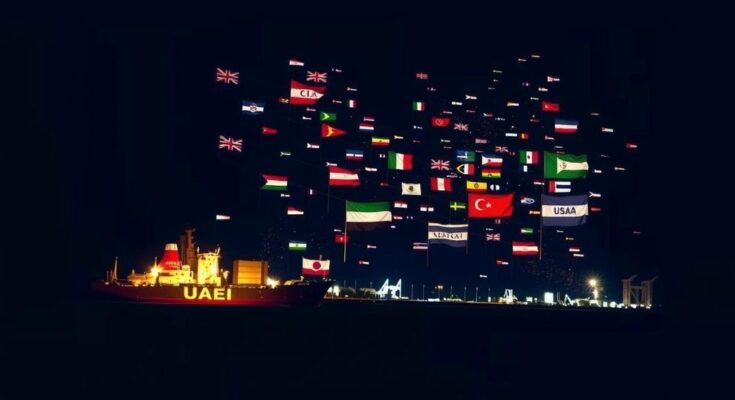Amnesty International reports that UAE-manufactured armored vehicles, equipped with French defense systems, have been captured by Sudanese forces amid the civil war in Sudan. This deployment likely violates a UN arms embargo, contributing to the conflict that has led to significant fatalities and displacements. The UAE denies allegations of supplying weapons to the Rapid Support Forces, asserting that they are a target of disinformation.
Amnesty International has reported that armored vehicles manufactured in the United Arab Emirates (UAE), outfitted with French defense systems, have been captured by the Sudanese army amid the ongoing civil war in Sudan. These UAE-made armored personnel carriers have been identified throughout Sudan, particularly in the Darfur region, where they are reportedly utilized by the paramilitary group, Rapid Support Forces (RSF), in conflicts against the Sudanese Armed Forces. The organization asserts that the deployment of these military vehicles likely constitutes a violation of the United Nations arms embargo on Sudan, which prohibits the transfer of weapons to the country. The civil war erupted in April 2023 due to escalating tensions between the RSF and the Sudanese army, resulting in widespread human rights abuses. Over 20,000 fatalities have been documented in this conflict, with approximately 11.6 million individuals displaced, including 8.3 million internally and 3.1 million seeking refuge in neighboring countries. Sudanese authorities have alleged that the UAE has been supplying the RSF with weapons, claims which the UAE vehemently denies. Amnesty International’s findings include the identification of Nimr Ajban armored personnel carriers, which were manufactured by Edge Group in the UAE and equipped with the Galix reactive defense system produced in France by Lacroix Defense and KNDS France. Agnès Callamard, Secretary General of Amnesty International, stated, “Our research shows that weaponry designed and manufactured in France is in active use on the battlefield in Sudan.” In response to the report, Lacroix stated that the Galix systems were supplied explicitly for smoke-screening countermeasures for the Emirati Armed Forces. The Emirati government has claimed that it is the target of a coordinated disinformation campaign designed to undermine its foreign policy and humanitarian efforts, stating, “the UAE is not providing support or supplies to the RSF or any of the belligerent warring parties in Sudan.” Lastly, the United States has imposed sanctions on Algoney Hamdan Daglo Musa, a senior RSF leader, for reportedly facilitating arms supplies throughout the conflict. Daglo has been identified as controlling a front company, Tradive General Trading LLC, which purportedly imported vehicles into Sudan for the RSF, modifying them with weaponry.
The ongoing civil war in Sudan, which commenced in April 2023, has escalated tensions between various armed factions, particularly the paramilitary Rapid Support Forces and the Sudanese Armed Forces. The conflict has resulted in severe humanitarian crises, including significant loss of life and displacement. The allegations against the UAE regarding their military involvement in Sudan raise critical questions about adherence to international arms embargoes and the global response to the existing violence in the region. The report from Amnesty International highlights the urgent need for accountability regarding the supply of military equipment to factions engaged in conflict, signifying potential violations of international law. With the involvement of foreign military systems, particularly those produced in France, the situation underscores the complexity of international relations in conflict zones.
In summary, Amnesty International has indicated that the presence of UAE-made armored vehicles in Sudan likely constitutes a breach of the United Nations arms embargo, amidst the ongoing civil war that has claimed countless lives and displaced millions. The UAE has rejected these allegations, affirming its non-involvement in the conflict. These developments necessitate a closer examination of international arms sales and their accountability in conflict situations, ensuring compliance with established embargoes.
Original Source: www.arkansasonline.com




